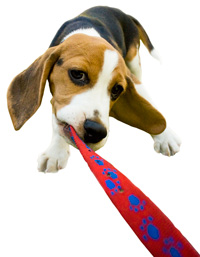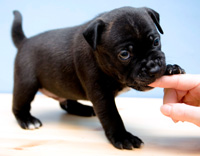It is often a challenge to convince a new rambunctious puppy to not bite the hand that feeds them, pets them and plays with them. Nipping and mouthing is a very common and normal behavior, when puppies play with each other, they use their mouths, so they tend to do the same thing when they interact with people. This is rarely an aggressive behavior intended to harm, but it can be a difficult habit to break without some good practical tools in your bag. 
Most puppy play consists of chasing, pouncing, barking, growling, snapping and biting. So how can you tell the difference between normal play and true aggression? In normal play, a puppy will “play bow” where they will lower their head and raise their hind end. They also present their front end to you, hold the front part of their body up, wag their tail, dart back and forth, they emit high-pitched barks and growls, and spontaneously play-attack.
Behaviors that may indicate early aggression include prolonged deep-tone growling, a fixed gaze, stiff posturing and aggression that is not spontaneous, that is aggression that is not situational or stimulus-dependent. These aggressive behaviors may be related to fear, possessiveness, conflict or pain. Of course, even normal puppy play can become too intense, and when this happens, you must intervene appropriately.
Distraction is the best prevention, nipping or biting often occurs in puppies when they are being petted or played with. A quick and easy method for redirecting your puppy’s attention is offering a more acceptable object to gnaw on, such as a chew toy, at the same time as you start to pet them. One hand offers the toy while the other hand reaches out to pet them.
One great toy to use is a treat release toy such as a Kong, filled with training treats like Zukes Mini Naturals or Cloud Star Tricky Trainers; good training, good nutrition and fun! This helps your puppy to learn that people and petting is a positive experience and also keeps their mouth busy. Try alternating the hand that does the petting and which one offers the chew toy. Remember, the longer they are petted, the more likely they are to get excited and start to nip, so you may need to shorten play sessions, at least initially.
When your pup does nip or bite you, a good strategy is to imitate what another puppy would do if they were bitten. Make a high-pitched “yipping” noise – or loudly say ouch and immediately walk away. Ignoring your puppy for a few minutes teaches them that biting you makes you go away, which is an immediate negative reinforcement for the behavior. Then you can return a little later and try playing again. It is generally not a good idea to sit on the floor with your puppy for prolonged periods of play time. This has a tendency to overexcite puppies and places you in a vulnerable position, making it more difficult to control the puppy.
 Here are a few other tips for encouraging appropriate play: Here are a few other tips for encouraging appropriate play:
Provide plenty of exercise – your puppy is a bundle of energy, so give them plenty of chances to discharge this energy. Walks are a fantastic way to do this, short but frequent walks help your pup vent pent up energy and gives them an appropriate outlet for all that motion.
Play – playing fetch or kicking a ball around the yard lets them burn off some energy, whilst strengthening your bond.
Obedience training – teach and review basic obedience commands early on as well trained dogs are more likely to follow orders when misbehaving.
Time Out – if your puppy won’t stop biting, put them in a room or their kennel with toys to keep them busy until they calm down.
Be consistent – it is very important that all behaviors are managed consistently by all members of the family.
Promote socialization – exposure to a variety of people and other animals as your puppy grows and develops, especially during the fist four months, will help prevent asocial behaviors, fears and biting.
The worst thing you can do is physically punish you puppy for this natural behavior, although many people incorrectly do so. This includes scruff shakes, alpha rollovers, forcing the puppy to the floor or pinning them down, thumping or swatting their nose, hitting or kicking, e-collars or muzzling. When physical punishment is used, several things may happen, depending on your puppy’s temperament and the severity of the punishment. A puppy that is hit or slapped in the face for biting can react by becoming “hand shy” and cringe or cower whenever a hand comes toward their face, respond in a defensive manner and attempt to bite to defend themselves or interpret as an invitation to play, causing them to become more excited and even more likely to bite.
As I mentioned earlier, it is quite normal for puppies to bite, mouth and nip. It rarely becomes a serious problem but it is critical to correct these behaviors before the dog becomes an adult, once the dog is older, their bites can inflict serious injury. The natural tendencies of a biting puppy will not be eliminated overnight but taking the right steps to stop a biting puppy now can help prevent a lot of damage in the future.
|